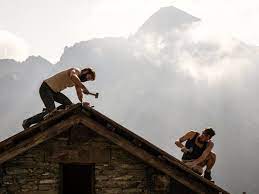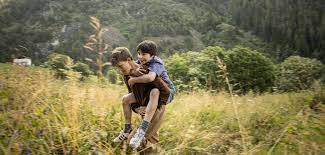
Inutterably gorgeous and inexpressively sad, “The Eight Mountains” is an Italian journey of male self-discovery, a “Razor’s Edge” without a war, “Eat Pray Love” with a little less indulgence.
Based on a novel by Paolo Cognetti, it wrestles with a man’s fate and the ennui that comes with recognizing your destiny. These existential themes are seen through the eyes of a man who remembers his lifelong friendship from the days when Pietro was a city boy, curious about the world, bristling at life’s boundaries and the role he is ordained to take, and his new “montanero” friend, Bruno, whose life path seemed set from birth.
Pietro (Lupo Barbiero) grew up in Turin. He was 12 when he spent that first summer in the Grenan Mountains, in a once-thriving cheese-making village that in the ’80s had shrunk to just 14 inhabitants and only one child, Bruno (Cristiano Sassella), who also happened to be his age.
They became fast friends, wandering the Alpine meadows, swimming in an Alpine lake with Pietro, given the dialect nickname “Berio” (both mean “rock”), helping with Bruno’s chores with the dairy cattle and goats.
Bruno is smart, with a natural engineering inclination. But he is trapped there, or so Pietro’s parents think. He’s also more athletic, something Pietro resents as his engineer father (Filippo Timi) likes to take vigorous hikes up mountains and glaciers when he visits and Bruno is better at it.
Dad seems to prefer the more robust Bruno, which causes Pietro to toss a tantrum when his parents try to arrange for the country boy to come live with them and get a proper schooling in the city. His mother speaks of giving Bruno “choices” in life, which Pietro resists. He wants his summer-in-the-mountains friend.
But Bruno’s absent, construction-worker dad vetoes this, and instead takes Bruno with him to work on a distant project. Pietro’s parents sealed Bruno’s fate by interfering, and Pietro lost his playmate.
“His adult life started at 13,” the adult Pietro (Luca Marinelli) laments in voice-over.
They’re separated, with Bruno the brick-layer working away and indulged only-child Pietro (Andrea Palma plays him as an adolescent) drifting through school, unfocused about what to do with his life, leading to a serious teenaged estrangement from his highly-strung careerist Dad.
“I never want to become like you,” Pietro lashes out, in Italian with English subtitles.
Only after Pietro’s father dies does he renew his relationship with Bruno as his friend is determined to rebuild a long-ruined cabin in the alpeggio — the high pasture — that Pietro’s dad bought and made Bruno promise to fix up.
As they reunite to accomplish this, Pietro realizes Bruno was in closer touch with his father than he was, and may have even understood him better. As more years pass and Pietro wanders the Himalayas in between returns to the alpeggio adn the life Bruno makes there, he and we see, compare and measure two divergent life paths and the barriers to happiness and fulfillment in each.
There’s a little of Winston Groom’s “Forrest Gump” theme underlying “The Eight Mountains.” The title, an Eastern metaphor, suggests two paths to fulfillment — one wandering, climbing assorted peaks, the other, staying close to where you grew up and mastering that environment, that one mountain.
Husband and wife filmmakers Felix van Groeningen and Charlotte Vandermeersch, teaming up for the first time (he directed “Beautiful Boy,” she used to be an actress), tap into the story’s existential angst, that finding-one’s-way/finding-one’s-place that every generation faces in accordance with the world they grows up in.
The performances are subdued and sublime, highlighting each character’s efforts to reject or embrace his fate, or both. Masculine silence, the things men don’t say out loud to each other, underlies every conversation.
The filmmakers perfectly set the tone for the film by scoring it to the music of Swedish singer-songwriter (in English) Daniel Norgren, whose DIY instruments and simply-produced laments unerringly put us in the characters’ frame of mind.
I don’t think “The Eight Mountains” is exclusionary or gender-specific enough to be inscrutable to women, any more than “Eat Pray Love” was for men. But you may have to be a grown man to wholly appreciate what this exquisite, heartbreaking movie is getting at, the melanchly nostalgia that hangs over it.
Rating: unrated
Cast: Luca Marinelli, Alessandro Borghi, Lupo Barbiero, Cristiano Sassella, Elisabetta Mazzullo, Andrea Palma and Filippo Timi
Credits: Scripted and directed by Felix van Groeningen and Charlotte Vandermeersch, based on the novel by Paolo Cognetti. A Janus Films release.
Running time: 2:27



